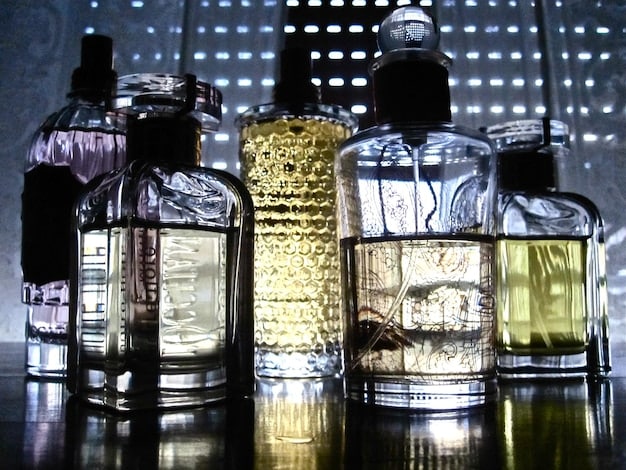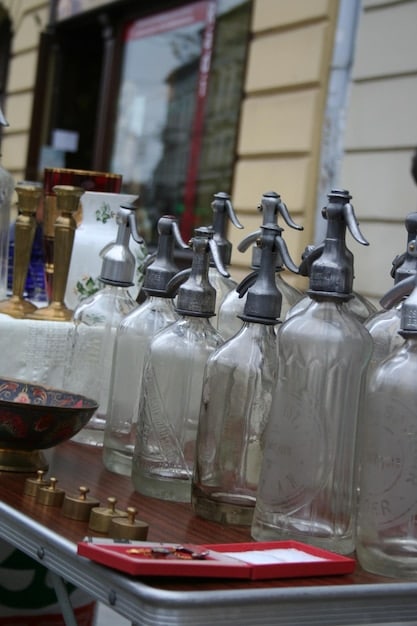Mastering the Perfume Wardrobe: A German Guide for Every Occasion

Advertisements
Mastering the perfume wardrobe in Germany involves curating a collection of fragrances suitable for various occasions, seasons, and personal preferences, ensuring you always have the perfect scent to complement your style and enhance your presence.
Building a **mastering the perfume wardrobe: building a collection for every occasion in Germany** can be an exciting and fulfilling journey. It’s about more than just accumulating bottles; it’s about creating a personalized olfactory experience that reflects your identity and enhances every moment.
Advertisements
Understanding the Basics of Perfume Composition
Before embarking on the journey of building a perfume wardrobe, understanding the basics of perfume composition is crucial. This knowledge will help you appreciate the nuances of different scents and make informed decisions about what to add to your collection.
Fragrance Families
Perfumes are typically categorized into fragrance families, which share common characteristics. Familiarizing yourself with these families will guide your preferences and help you identify the types of scents you gravitate towards.
Advertisements
- Floral: Characterized by sweet and powdery notes, reminiscent of flowers like roses, jasmine, and lilies.
- Oriental: Warm and spicy, featuring notes like amber, vanilla, cinnamon, and cloves.
- Woody: Earthy and grounding, with notes such as cedarwood, sandalwood, patchouli, and vetiver.
- Fresh: Clean and invigorating, often featuring citrus, aquatic, and green notes.
Perfume Concentrations
Perfume concentrations indicate the percentage of perfume oil in a fragrance, influencing its longevity and intensity. Understanding these concentrations is essential for choosing the right perfume for different occasions.
- Parfum: The highest concentration, offering the longest wear time (6-8 hours) and the most intense scent.
- Eau de Parfum (EdP): A moderate concentration, lasting 4-5 hours with a noticeable scent.
- Eau de Toilette (EdT): A lighter concentration, typically lasting 2-3 hours, suitable for everyday wear.
- Eau de Cologne (EdC): The lightest concentration, lasting about 2 hours, ideal for a quick refresh.
Understanding the composition of perfumes, from fragrance families to concentrations, lays the groundwork for building a versatile and personalized perfume wardrobe. This initial knowledge empowers you to make informed choices that align with your preferences and lifestyle.
Curating Scents for Different Seasons in Germany
Germany’s distinct seasons demand a versatile perfume wardrobe that can adapt to varying weather conditions and moods. Different scents perform differently in heat versus cold, making it essential to curate your collection accordingly.

Spring
Spring in Germany calls for light and fresh fragrances that mirror the blossoming flowers and warmer temperatures. Opt for scents with floral and fruity notes to capture the essence of the season.
- Light florals: Scents featuring notes like lily of the valley, lilac, and cherry blossom.
- Fruity blends: Fragrances with hints of green apple, pear, or raspberry.
- Green notes: Perfumes with grassy or leafy accords for a refreshing touch.
Summer
Summer demands perfumes that are light and airy, able to withstand the heat without becoming overpowering. Citrus and aquatic notes are excellent choices for this season.
- Citrus scents: Fragrances with notes of lemon, grapefruit, and orange for a zesty and refreshing feel.
- Aquatic notes: Perfumes that evoke the ocean with accords of sea salt, algae, and marine breeze.
- Light florals: Delicate floral fragrances that won’t become too heavy in the heat.
Autumn
Autumn in Germany is a time for warmer, earthier scents that complement the changing foliage and cooler temperatures. Woody and spicy notes are ideal for this season.
- Woody fragrances: Scents with notes of cedarwood, sandalwood, and vetiver for a grounding effect.
- Spicy accords: Perfumes featuring cinnamon, cloves, and nutmeg for a warm and inviting feel.
- Gourmand notes: Scents with hints of vanilla, caramel, or coffee for a cozy touch.
Winter
Winter calls for rich and opulent fragrances that provide warmth and comfort during the cold months. Oriental and gourmand scents are excellent choices.
- Oriental fragrances: Scents with notes of amber, vanilla, and musk for a luxurious feel.
- Gourmand perfumes: Fragrances featuring chocolate, tonka bean, and praline for a sweet and comforting scent.
- Woody accords: Deep woody notes that provide a sense of warmth and sophistication.
Adapting your perfume wardrobe to Germany’s distinct seasons ensures you always have the perfect fragrance to complement the weather and enhance your overall experience, making each season more enjoyable.
Building a Collection for Different Occasions
A well-rounded perfume wardrobe should include scents suitable for various occasions, from everyday wear to special events. Having the right fragrance can enhance your confidence and make a lasting impression.
Everyday Wear
For everyday wear, opt for light and versatile fragrances that are not overpowering. These scents should be comfortable and suitable for various settings, such as the office, running errands, or casual outings.
- Light florals: Delicate floral perfumes that are fresh and unobtrusive.
- Citrus scents: Zesty and refreshing fragrances that provide an energizing boost.
- Clean musk: Subtle musk-based scents that are comforting and versatile.
Work Environment
When choosing a perfume for the work environment, it’s important to be mindful of others and select scents that are professional and not too strong. Subtle and refined fragrances are ideal.
- Subtle woody scents: Light woody fragrances that are grounding and sophisticated.
- Clean and crisp florals: Delicate floral scents that are fresh and professional.
- Minimalist compositions: Simple and understated fragrances that are not overpowering.
Evening Events
Evening events call for more opulent and alluring fragrances that make a statement. These scents should be more intense and memorable.
- Rich oriental fragrances: Luxurious oriental scents with notes of amber, vanilla, and spices.
- Bold florals: Intense floral compositions that are captivating and elegant.
- Woody-amber blends: Sophisticated blends of woody and amber notes that exude confidence.
Special Occasions
For special occasions like weddings or milestone celebrations, choose fragrances that are unique and unforgettable. These scents should reflect the significance of the event.
- Unique and rare fragrances: Niche perfumes with distinctive and memorable accords.
- Classic and timeless scents: Iconic fragrances that have stood the test of time.
- Luxurious and elegant compositions: Perfumes with high-quality ingredients and sophisticated blends.
Creating a perfume wardrobe that caters to different occasions ensures you always have the perfect scent to enhance your experience and make a memorable impression, whether it’s a casual day out or a special event.

Exploring German Perfume Brands and Local Preferences
Germany boasts a rich heritage of perfume craftsmanship, with several notable brands and unique local preferences. Exploring these aspects can add a distinct touch to your perfume wardrobe.
Popular German Perfume Brands
Several German perfume brands have gained international recognition for their quality and craftsmanship. Discovering these brands can offer unique olfactory experiences.
- 4711 Original Eau de Cologne: A classic German fragrance known for its refreshing and invigorating scent.
- Hugo Boss: A renowned brand offering a range of sophisticated and modern fragrances.
- Jil Sander: Known for its minimalist and elegant perfumes with clean compositions.
Local Scent Preferences in Germany
Understanding local scent preferences can help you align your perfume choices with the tastes of the German population.
- Preference for clean and fresh scents: Germans often appreciate fragrances that are clean, crisp, and not too overpowering.
- Appreciation for quality and craftsmanship: Quality ingredients and well-crafted compositions are highly valued.
- Growing interest in niche and artisanal perfumes: There’s an increasing interest in unique and less mainstream fragrances.
Finding Unique Fragrances in German Boutiques
German boutiques and perfumeries offer a curated selection of fragrances, including niche brands and local creations. Exploring these stores can lead to discovering hidden gems.
- Independent Perfumeries: Boutiques that specialize in niche and artisanal perfumes.
- Department Stores: Offering a wide range of international and German perfume brands.
- Online Retailers: Providing access to a vast selection of fragrances from the comfort of your home.
By exploring German perfume brands, understanding local preferences, and visiting unique boutiques, you can curate a perfume wardrobe that reflects your personal style while embracing the rich olfactory heritage of Germany.
Storing and Maintaining Your Perfume Collection
Proper storage and maintenance are essential for preserving the quality and longevity of your perfume collection. Following these guidelines will ensure your fragrances remain fresh and retain their intended aroma.
Ideal Storage Conditions
Perfumes are sensitive to light, heat, and humidity. Storing them in the right conditions is crucial for preventing degradation.
- Keep perfumes away from direct sunlight: Prolonged exposure to sunlight can alter the composition and color of the fragrance.
- Store perfumes in a cool, dark place: A consistent temperature is ideal for preserving the scent.
- Avoid storing perfumes in the bathroom: Humidity and temperature fluctuations can damage the fragrance.
Proper Handling Techniques
Handling perfumes with care can prevent contamination and prolong their shelf life.
- Avoid shaking the perfume bottle: Shaking can introduce air bubbles that can degrade the fragrance over time.
- Keep the bottle tightly closed: Exposure to air can cause the perfume to oxidize and lose its scent.
- Handle the bottle with clean hands: Oils and dirt from your hands can contaminate the perfume.
Longevity and Expiration
Understanding the shelf life of perfumes and recognizing signs of expiration can help you maintain the quality of your collection.
- Most perfumes last 3-5 years: The shelf life can vary depending on the fragrance’s composition and storage conditions.
- Signs of expiration include changes in color, scent, and texture: If a perfume smells different or appears discolored, it may be expired.
- Rotate your perfumes regularly: Using different fragrances in your collection can prevent any one bottle from sitting unused for too long.
By following these simple guidelines for storing and maintaining your perfume collection, you can ensure your fragrances remain fresh, vibrant, and retain their intended aroma for years to come.
Budgeting and Expanding Your Perfume Wardrobe
Building a perfume wardrobe can be an enjoyable and rewarding experience, but it’s important to manage your budget and expand your collection strategically. Here are some tips to help you create a well-rounded wardrobe without breaking the bank.
Setting a Budget
Before you start buying perfumes, establish a budget to help you stay within your financial means. Determine how much you can afford to spend each month or year on fragrances.
- Calculate your disposable income: Determine how much money you have available after covering essential expenses.
- Allocate a percentage of your budget to perfumes: Decide what portion of your disposable income you’re comfortable spending on fragrances.
- Track your spending: Keep a record of your perfume purchases to ensure you stay within your budget.
Strategic Purchasing
When buying perfumes, consider purchasing smaller bottles, sampling fragrances, and taking advantage of sales and discounts to maximize your budget.
- Buy smaller sizes: Opt for 30ml or 50ml bottles instead of larger sizes to save money and try out different scents.
- Sample before you buy: Purchase samples or visit perfume counters to test fragrances before investing in a full bottle.
- Take advantage of sales and discounts: Look for seasonal sales, promotions, and discount codes to save money on your perfume purchases.
Expanding Your Collection
Gradually expand your perfume wardrobe by adding fragrances that complement your existing scents and address gaps in your collection. Focus on versatility, quality, and personal preference.
- Identify gaps in your collection: Determine which fragrance families or occasions are not adequately represented in your wardrobe.
- Add versatile fragrances: Choose scents that can be worn in multiple settings and seasons.
- Prioritize quality over quantity: Invest in high-quality perfumes that will last longer and provide a more enjoyable experience.
By setting a budget, purchasing strategically, and expanding your collection thoughtfully, you can curate a perfume wardrobe that is both diverse and affordable. This approach allows you to enjoy a wide range of scents without overspending.
| Key Point | Brief Description |
|---|---|
| 🌸 Seasonal Scents | Choose lighter florals in spring, citrus in summer, woody scents in autumn, and orientals in winter. |
| 💼 Occasion-Based | Opt for subtle scents for work, bold perfumes for evenings, and unique fragrances for special events. |
| 🇩🇪 Explore German Brands | Discover local brands like 4711 and Hugo Boss for unique, quality fragrances. |
| ☀️ Storage Tips | Store perfumes in cool, dark places away from sunlight to maintain their quality. |
Frequently Asked Questions (FAQ)
▼
A perfume wardrobe is a collection of fragrances tailored to suit different occasions, seasons, and moods. It allows you to choose the perfect scent to complement your personal style and lifestyle.
▼
The ideal number of perfumes varies by personal preference, but a good starting point is 5-7 fragrances. This allows for variety across seasons, occasions, and moods without being overwhelming.
▼
Consider the occasion and desired longevity. Parfum is best for special events, Eau de Parfum for evenings, Eau de Toilette for everyday wear, and Eau de Cologne for a quick refresh.
▼
The main fragrance families include floral, oriental, woody, and fresh. Each family has distinct characteristics, so understanding them helps you find scents that match your taste.
▼
Apply perfume to pulse points (wrists, neck), moisturize skin beforehand, and avoid rubbing the fragrance in. Proper storage in a cool, dark place also helps maintain its longevity.
Conclusion
Creating a **mastering the perfume wardrobe: building a collection for every occasion in Germany** is a journey of self-discovery and sensory exploration. By understanding fragrance families, seasonal scents, and proper storage techniques, you can curate a collection that elevates every moment. Embrace the art of fragrance and let your perfume wardrobe reflect your unique style and personality, ensuring you always have the perfect scent for any occasion.